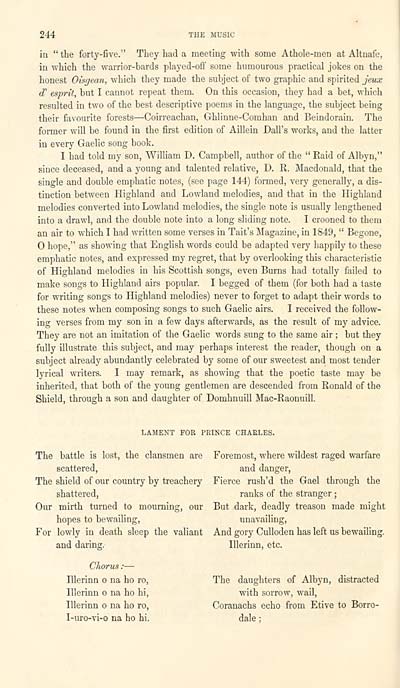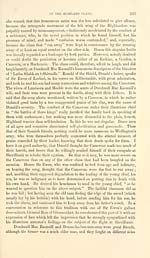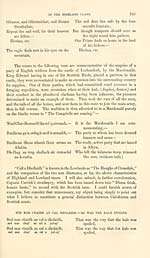Download files
Complete book:
Individual page:
Thumbnail gallery: Grid view | List view

244 THE MUSIC
in " the forty-five." Tbey had a meetiug with some Athole-men at Altnafe,
in which the warrior-bards played-ofl' some humourous practical jokes on the
honest Oisgean, which they made the subject of two graphic and spirited jeux
d' esprit, but I cannot repeat them. On this occasion, they had a bet, which
resulted in two of the best descriptive poems in the language, the subject being
their favourite forests — Coirreachan, Ghlinne-Comhan and Beindorain. The
fonner will be found in the first edition of Aillein Dall's works, and the latter
in every Gaelic song book.
I had told my son, William D. Campbell, author of the " Eaid of Albyn,"
since deceased, and a young and talented relative, D. R. Macdonakl, that the
single and double emphatic notes, (see page 144) formed, very generally, a dis-
tinction between Highland and Lowland melodies, and that in the Highland
melodies converted into Lowland melodies, the single note is usually lengthened
into a drawl, and the double note into a long sliding note. I crooned to them
an air to which I had written some verses in Tait's Magazine, in 1S49, " Begone,
hope," as showing that English words could be adapted very happily to these
emphatic notes, and expressed my regret, that by overlooking this characteristic
of Highland melodies in his Scottish songs, even Burns had totally failed to
make songs to Highland airs popular. I begged of them (for both had a taste
for writing songs to Highland melodies) never to forget to adapt their words to
these notes when composing songs to such Gaelic airs. I received the follow-
ing verses from my son in a few days afterwards, as the result of my advice.
They are not an imitation of the Gaelic words sung to the same air ; but they
fully illustrate this subject, and may perhaps interest the reader, though on a
subject already abundantly celebrated by some of our sweetest and most tender
lyrical writers. I may remark, as showing that the poetic taste may be
inherited, that both of the young gentlemen are descended from Ronald of the
Shield, through a son and daughter of Domhnuill Mac-Raonuili.
LAMENT FOR PRINCE CHARLES.
The battle is lost, the clansmen are Foremost, where wildest raged warfare
scattered, and danger.
The shield of our country by treachery Fierce rush'd the Gael through the
shattered, ranks of the stranger ;
Our mirth turned to mourning, our But dark, deadly treason made might
hopes to bewailing, unavailing,
For lowly in death sleep the valiant And gory Culloden has left us bewailing.
and daring. Illerinn, etc.
Chorus : —
Illerinn o na ho ro. The daughters of Albyn, distracted
Illerinn o na ho hi, with sorrow, wail,
Illerinn o na ho ro, Coranachs echo from Etive to Borro-
I-uro-vi-o na ho hi. dale ;
in " the forty-five." Tbey had a meetiug with some Athole-men at Altnafe,
in which the warrior-bards played-ofl' some humourous practical jokes on the
honest Oisgean, which they made the subject of two graphic and spirited jeux
d' esprit, but I cannot repeat them. On this occasion, they had a bet, which
resulted in two of the best descriptive poems in the language, the subject being
their favourite forests — Coirreachan, Ghlinne-Comhan and Beindorain. The
fonner will be found in the first edition of Aillein Dall's works, and the latter
in every Gaelic song book.
I had told my son, William D. Campbell, author of the " Eaid of Albyn,"
since deceased, and a young and talented relative, D. R. Macdonakl, that the
single and double emphatic notes, (see page 144) formed, very generally, a dis-
tinction between Highland and Lowland melodies, and that in the Highland
melodies converted into Lowland melodies, the single note is usually lengthened
into a drawl, and the double note into a long sliding note. I crooned to them
an air to which I had written some verses in Tait's Magazine, in 1S49, " Begone,
hope," as showing that English words could be adapted very happily to these
emphatic notes, and expressed my regret, that by overlooking this characteristic
of Highland melodies in his Scottish songs, even Burns had totally failed to
make songs to Highland airs popular. I begged of them (for both had a taste
for writing songs to Highland melodies) never to forget to adapt their words to
these notes when composing songs to such Gaelic airs. I received the follow-
ing verses from my son in a few days afterwards, as the result of my advice.
They are not an imitation of the Gaelic words sung to the same air ; but they
fully illustrate this subject, and may perhaps interest the reader, though on a
subject already abundantly celebrated by some of our sweetest and most tender
lyrical writers. I may remark, as showing that the poetic taste may be
inherited, that both of the young gentlemen are descended from Ronald of the
Shield, through a son and daughter of Domhnuill Mac-Raonuili.
LAMENT FOR PRINCE CHARLES.
The battle is lost, the clansmen are Foremost, where wildest raged warfare
scattered, and danger.
The shield of our country by treachery Fierce rush'd the Gael through the
shattered, ranks of the stranger ;
Our mirth turned to mourning, our But dark, deadly treason made might
hopes to bewailing, unavailing,
For lowly in death sleep the valiant And gory Culloden has left us bewailing.
and daring. Illerinn, etc.
Chorus : —
Illerinn o na ho ro. The daughters of Albyn, distracted
Illerinn o na ho hi, with sorrow, wail,
Illerinn o na ho ro, Coranachs echo from Etive to Borro-
I-uro-vi-o na ho hi. dale ;
Set display mode to: Large image | Transcription
Images and transcriptions on this page, including medium image downloads, may be used under the Creative Commons Attribution 4.0 International Licence unless otherwise stated. ![]()
| Early Gaelic Book Collections > Blair Collection > Treatise on the language, poetry, and music of the Highland clans > (256) |
|---|
| Permanent URL | https://digital.nls.uk/76239219 |
|---|
| Description | A selection of books from a collection of more than 500 titles, mostly on religious and literary topics. Also includes some material dealing with other Celtic languages and societies. Collection created towards the end of the 19th century by Lady Evelyn Stewart Murray. |
|---|
| Description | Selected items from five 'Special and Named Printed Collections'. Includes books in Gaelic and other Celtic languages, works about the Gaels, their languages, literature, culture and history. |
|---|

